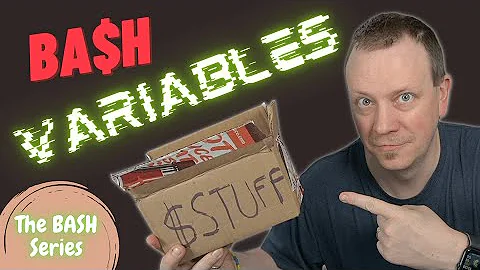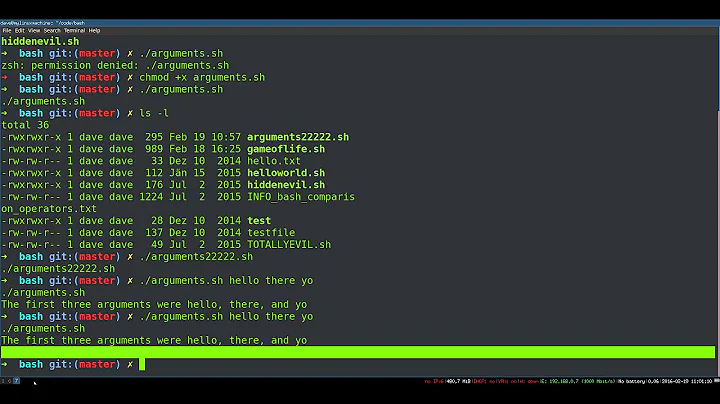How to split a string with quotes (like command arguments) in bash?
Solution 1
When I saw David Postill's answer, I thought "there must be a simpler solution". After some experimenting I found the following works:-
string='"aString that may haveSpaces IN IT" bar foo "bamboo" "bam boo"'
echo $string
eval 'for word in '$string'; do echo $word; done'
This works because eval expands the line (removing the quotes and expanding string) before executing the resultant line (which is the in-line answer):
for word in "aString that may haveSpaces IN IT" bar foo "bamboo" "bam boo"; do echo $word; done
An alternative which expands to the same line is:
eval "for word in $string; do echo \$word; done"
Here string is expanded within the double-quotes, but the $ must be escaped so that word in not expanded before the line is executed (in the other form the use of single-quotes has the same effect). The results are:-
[~/]$ string='"aString that may haveSpaces IN IT" bar foo "bamboo" "bam boo"'
[~/]$ echo $string
"aString that may haveSpaces IN IT" bar foo "bamboo" "bam boo"
[~/]$ eval 'for word in '$string'; do echo $word; done'
aString that may haveSpaces IN IT
bar
foo
bamboo
bam boo
[~/]$ eval "for word in $string; do echo \$word; done"
aString that may haveSpaces IN IT
bar
foo
bamboo
bam boo
Solution 2
The simplest solution is using making an array of the quoted args which you could then loop over if you like or pass directly to a command.
eval "array=($string)"
for arg in "${array[@]}"; do echo "$arg"; done
p.s. Please comment if you find a simpler way without eval.
Edit:
Building on @Hubbitus' answer we have a fully sanitized and properly quoted version. Note: this is overkill and will actually leave additional backslashes in double or single quoted sections preceding most punctuation but is invulnerable to attack.
declare -a "array=($( echo "$string" | sed 's/[][`~!@#$%^&*():;<>.,?/\|{}=+-]/\\&/g' ))"
I leave it to the interested reader to modify as they see fit http://ideone.com/FUTHhj
Solution 3
It looks that xargs can do it pretty well:
$ a='"aString that may haveSpaces IN IT" bar foo "bamboo" "bam boo"'
$ printf "%s" "$a" | xargs -n 1 printf "%s\n"
aString that may haveSpaces IN IT
bar
foo
bamboo
bam boo
Solution 4
How do I do that?
$ for l in "aString that may haveSpaces IN IT" bar foo "bamboo" "bam boo"; do echo $l; done
aString that may haveSpaces IN IT
bar
foo
bamboo
bam boo
What do I do if my string is in a bash variable?
The simple approach of using the bash string tokenizer will not work, as it splits on every space not just the ones outside quotes:
DavidPostill@Hal /f/test
$ cat ./test.sh
#! /bin/bash
string='"aString that may haveSpaces IN IT" bar foo "bamboo" "bam boo"'
for word in $string; do echo "$word"; done
DavidPostill@Hal /f/test
$ ./test.sh
"aString
that
may
haveSpaces
IN
IT"
bar
foo
"bamboo"
"bam
boo"
To get around this the following shell script (splitstring.sh) shows one approach:
#! /bin/bash
string=$(cat <<'EOF'
"aString that may haveSpaces IN IT" bar foo "bamboo" "bam boo"
EOF
)
echo Source String: "$string"
results=()
result=''
inside=''
for (( i=0 ; i<${#string} ; i++ )) ; do
char=${string:i:1}
if [[ $inside ]] ; then
if [[ $char == \\ ]] ; then
if [[ $inside=='"' && ${string:i+1:1} == '"' ]] ; then
let i++
char=$inside
fi
elif [[ $char == $inside ]] ; then
inside=''
fi
else
if [[ $char == ["'"'"'] ]] ; then
inside=$char
elif [[ $char == ' ' ]] ; then
char=''
results+=("$result")
result=''
fi
fi
result+=$char
done
if [[ $inside ]] ; then
echo Error parsing "$result"
exit 1
fi
echo "Output strings:"
for r in "${results[@]}" ; do
echo "$r" | sed "s/\"//g"
done
Output:
$ ./splitstring.sh
Source String: "aString that may haveSpaces IN IT" bar foo "bamboo" "bam boo"
Output strings:
aString that may haveSpaces IN IT
bar
foo
bamboo
bam boo
Source: StackOverflow answer Split a string only by spaces that are outside quotes by choroba. Script has been tweaked to match the requirements of the question.
Solution 5
You may do it with declare instead of eval, for example:
Instead of:
string='"aString that may haveSpaces IN IT" bar foo "bamboo" "bam boo"'
echo "Initial string: $string"
eval 'for word in '$string'; do echo $word; done'
Do:
declare -a "array=($string)"
for item in "${array[@]}"; do echo "[$item]"; done
But please note, it is not much safer if input comes from user!
So, if you try it with say string like:
string='"aString that may haveSpaces IN IT" bar foo "bamboo" "bam boo" `hostname`'
You get hostname evaluated (there off course may be something like rm -rf /)!
Very-very simple attempt to guard it just replace chars like backtrick ` and $:
string='"aString that may haveSpaces IN IT" bar foo "bamboo" "bam boo" `hostname`'
declare -a "array=( $(echo $string | tr '`$<>' '????') )"
for item in "${array[@]}"; do echo "[$item]"; done
Now you got output like:
[aString that may haveSpaces IN IT]
[bar]
[foo]
[bamboo]
[bam boo]
[?hostname?]
More details about methods and pros and cons you may found in that good answer: https://stackoverflow.com/questions/17529220/why-should-eval-be-avoided-in-bash-and-what-should-i-use-instead/17529221#17529221
But there still leaved vector for attack. I very want have in bash method of string quote like in double quotes (") but without interpreting content.
Related videos on Youtube
foxneSs
Updated on September 18, 2022Comments
-
foxneSs over 1 year
I have a string like this:
"aString that may haveSpaces IN IT" bar foo "bamboo" "bam boo"I want to be able to split it like this:
aString that may haveSpaces IN IT bar foo bamboo bam booHow do I do that? (preferrably using a one-liner)
-
 DavidPostill about 8 years
DavidPostill about 8 years -
foxneSs about 8 years@DavidPostill the questions are quite different actually.
-
 DavidPostill about 8 yearsNot really, it's the same general problem.
DavidPostill about 8 yearsNot really, it's the same general problem. -
 AFH about 8 years@DavidPostill - This is a much simpler problem: all it needs is
AFH about 8 years@DavidPostill - This is a much simpler problem: all it needs isfor l in "aString that may haveSpaces IN IT" bar foo "bamboo" "bam boo"; do echo $l; done -
 DavidPostill about 8 years@AFH lol. I just posted a much longer answer. The only difference in the output was that mine preserved the
DavidPostill about 8 years@AFH lol. I just posted a much longer answer. The only difference in the output was that mine preserved the"s. I missed the fact that the OP doesn't need them in the output. -
 DavidPostill about 8 years@AFH You should post your comment as the answer.
DavidPostill about 8 years@AFH You should post your comment as the answer. -
 AFH about 8 years@DavidPostill - It's more complicated if the string is in a variable. If the string is in
AFH about 8 years@DavidPostill - It's more complicated if the string is in a variable. If the string is in$s, thenfor l in $s; do echo $l; donetakes the quotes as literals and breaks at the spaces. I need to go out now, so feel free to work it out. -
barlop about 8 yearsit's called tokenizing a string.. e.g. modern programming/scripting languages / libraries, have a string tokenizer facility. For bash stackoverflow.com/questions/5382712/…
-
 DavidPostill about 8 years@barlop The tokening in the linked question splits on every space not just the ones outside quotes.
DavidPostill about 8 years@barlop The tokening in the linked question splits on every space not just the ones outside quotes.
-
-
Flamefire almost 5 yearsI have a testcase that breaks this:
string="bash -c 'echo \$USER'"which "leaves" the backslash. You sometimes need this for e.gssh






